This is part of my ongoing series in which I compare four translations of Final Fantasy VI with the original Japanese script. For project details and my translation notes from Day 1, see here.
Part 11: Floating Continent to World Destruction
During this stream we did the Imperial Air Force section, the Floating Continent stuff, and even the first part of the World of Ruin.
I feel the end of the world is a logical stopping place, so this article will only cover the first half of the stream until the world blows up. The next article will cover the rest of this stream + some of the following stream content.
Basically, until now, these article title numbers have matched the stream title numbers, but after this article they’re not going to match anymore.
Video Archive
Notes
My notes below are just a fraction of all the translation topics I covered during this stream. So if you want to see more changes, mistakes, and such, check out the first half of the video above.
Continental Drift
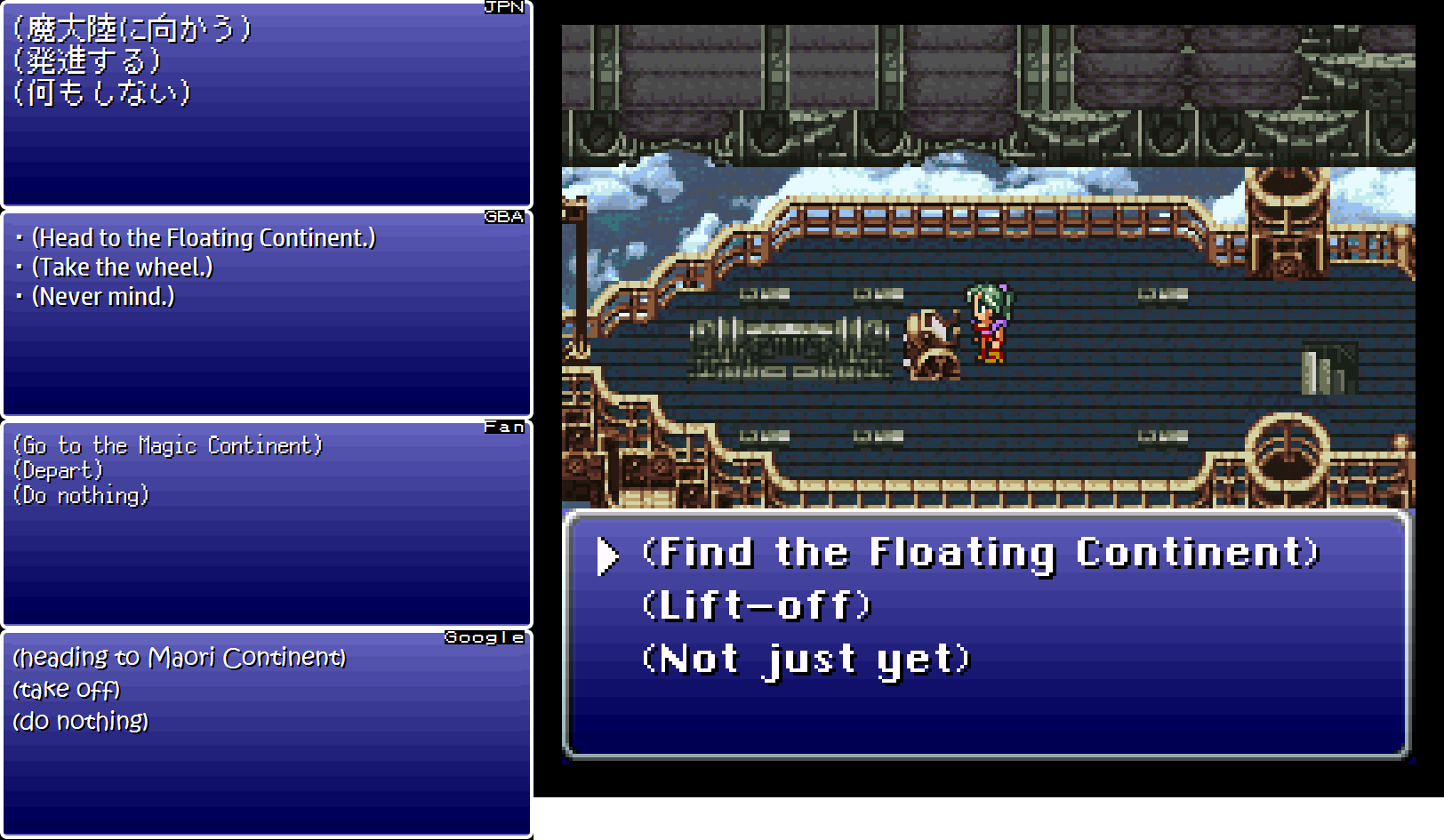
A gigantic continent has risen into the air. In the official English translations, this continent is called the “Floating Continent”. In Japanese, it’s the 魔大陸 (matairiku), which in this context would mean something like “Magic Continent”. In all the official Japanese strategy guides, it’s actually named in English as the “Enchanted Continent”:
Mr. Chupon
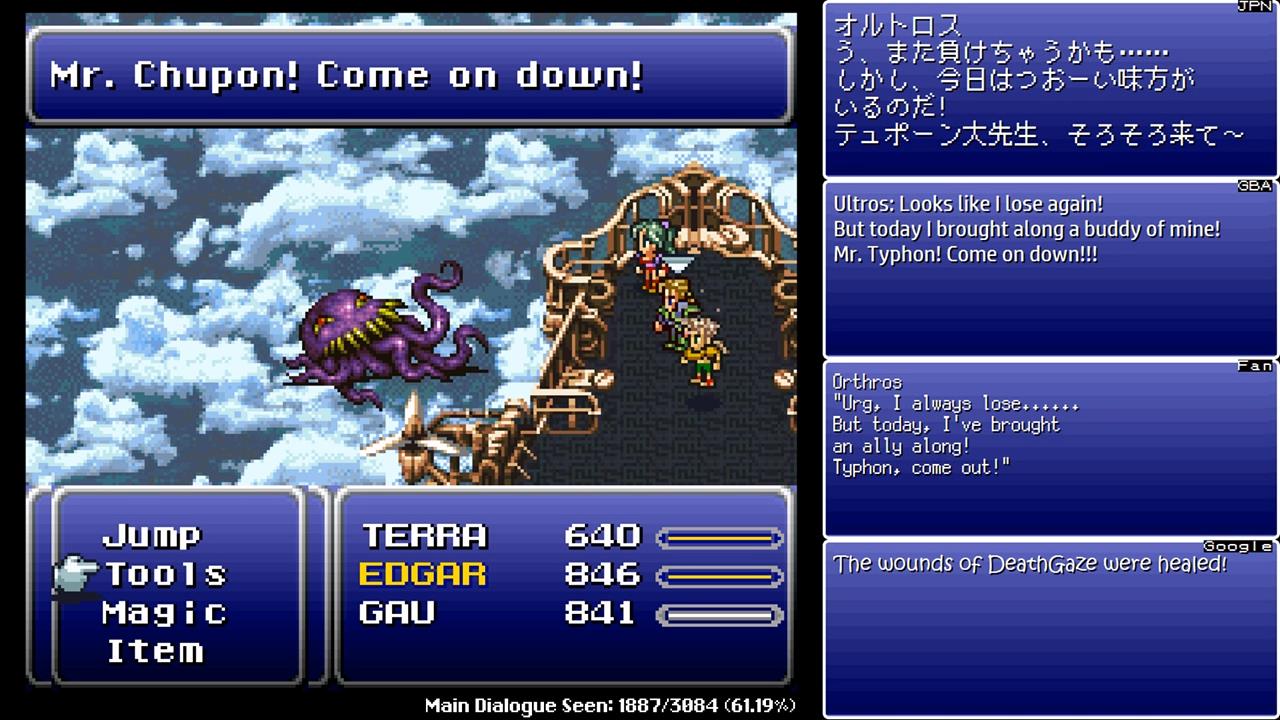
Ultros introduces his creepy monster friend to the heroes. In Japanese, the monster’s name is テュポーン (tupōn / tyupōn / chupōn). This uses some slightly unusual Japanese spelling and pronunciation, so it’s not immediately clear what it’s supposed to mean or how it should be spelled in English. As a result, the Super NES translator ended up going with “Chupon”.
On a different note, during the stream I mentioned some stuff about French, but I was thinking about a similar but slightly different name that gets used all the time.
The monster’s name is apparently a reference to a creature in Greek mythology known as Typhon. As we’ve seen many times already, it’s always difficult to handle names in translation when it’s bouncing around between ancient languages, Japanese, and English, so it’s completely understandable that the Super NES translator didn’t get the spelling correct. But the GBA translator had better resources and research, so the monster was renamed “Typhon” in the GBA translation.
The fan translation also changed Chupon’s name to “Typhon”. Fans excel at this kind of name origin research, as we can see here.
In English, Ultros calls his pal “Mr. Chupon”. In Japanese, he actually uses the name suffix 大先生 (daisensei) which in this case seems to indicate that Ultros respects him as a “master expert” of some sort. Given that Ultros also has a working-like relationship with Siegfried, I wonder if this is another similar relationship. All three end up at the coliseum later in the game too, so I feel like there’s some kind of logical connection between them at least. But I’m sure there are all kinds of official books that explain these relationships in detail.
On a different note, the Super NES translation makes a pretty clear reference to the American game show “The Price is Right” with the phrase “Come on down!”:
The Game Boy Advance translation keeps this reference, while the fan translations translates the original line in a straightforward manner with “come out!”.
The Emperor’s Offer
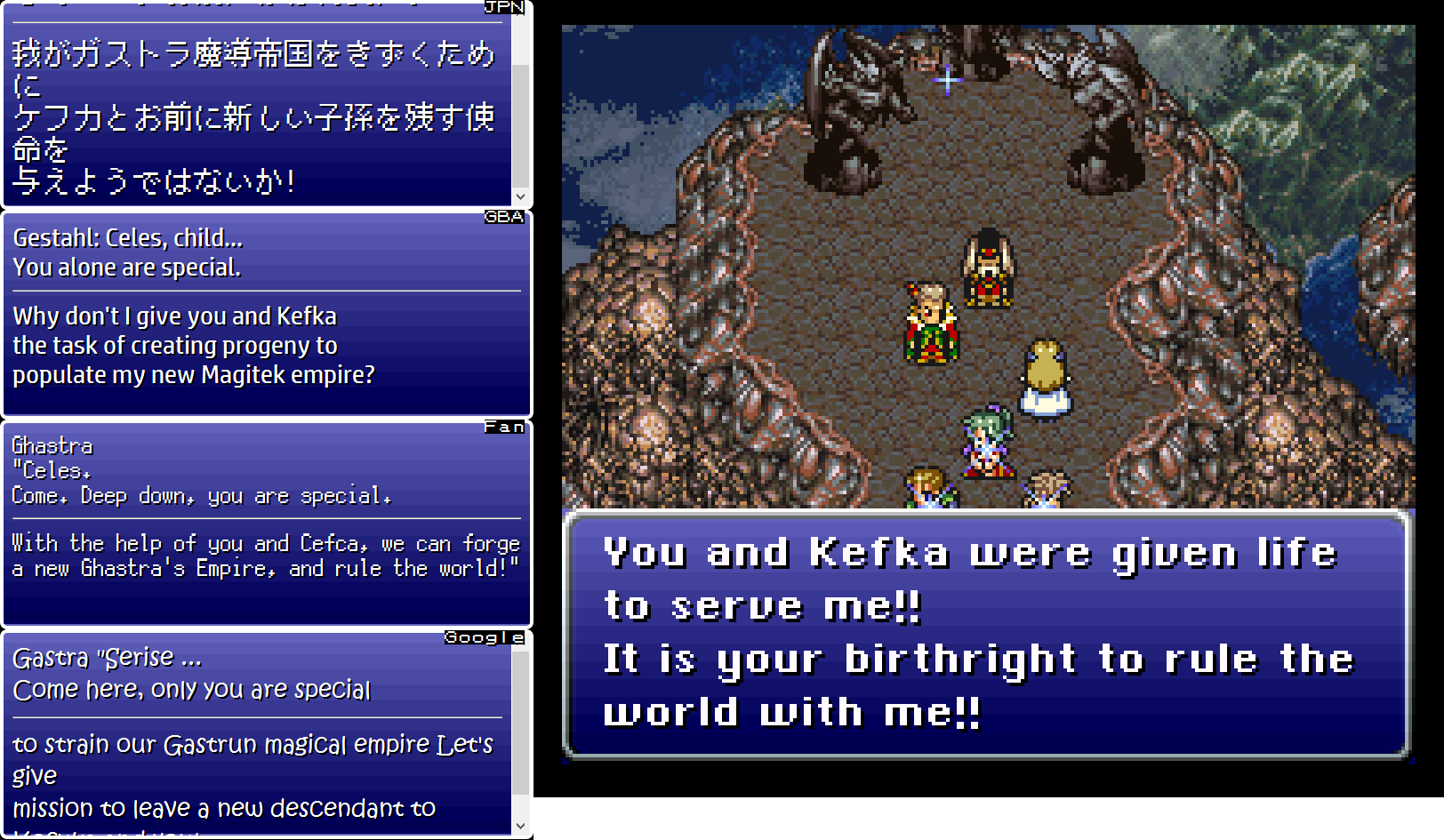
Emperor Gestahl offers to spare Celes’ life if she’ll rejoin him. In the Super NES translation, he says:
You and Kefka were given life to serve me!! It is your birthright to rule the world with me!!
The original Japanese script says something else, however:
Why don’t I give you and Kefka the task of producing offspring in order to build my Magic Empire of Gestahl?!
Basically, he wants Celes and Kefka to mate to produce magic-infused offspring for his new magic empire. …That’s nothing like what the Super NES version says!
The original Japanese text is kind of long-winded and I can see how maybe the Super NES translator might’ve misunderstood it if he was rushing through the line – particularly the second half about Kefka, Celes, and producing people. Still, it also seems like the kind of content that would’ve gotten changed anyway, had it been translated correctly to begin with. The GBA translation fixes this line and many others during this scene.
This is exactly the kind of content that you’d expect fan translators to pick up on, fix, and then point to and say “look at this big issue we fixed that the official guys don’t want you to see!”. Instead, we see that the fan translation is mostly a rewrite of the faulty Super NES script.
Kefka’s Pronouns
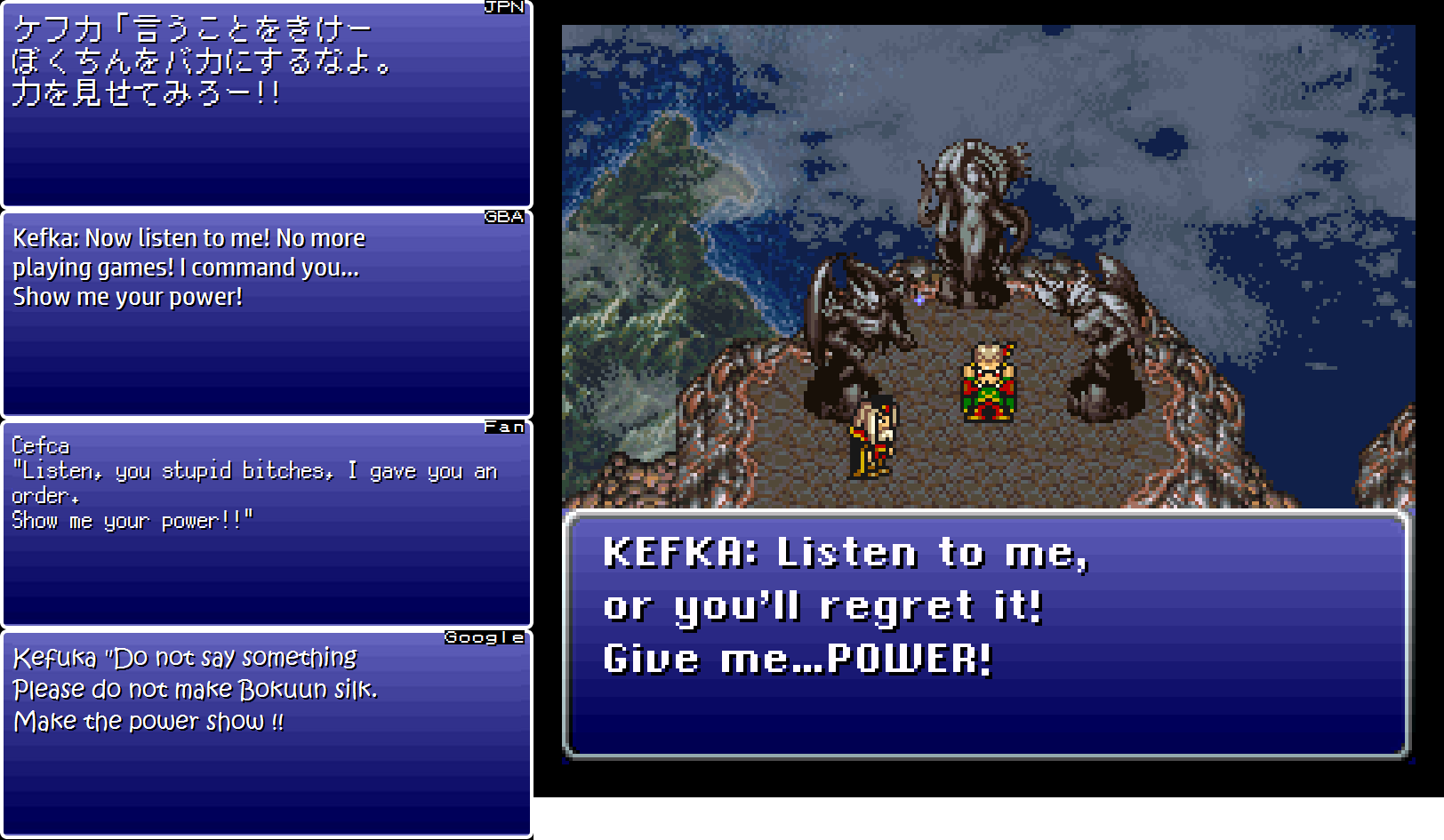
In English, we only have the pronouns “I” and “me”, but in Japanese there are lots of different personal pronouns available that it’s almost dizzying. For casual situations, you usually pick whichever pronoun you personally identify with the most, but it’s of course proper to use certain ones in certain situations.
In the Japanese version of Final Fantasy VI, Kefka switches his pronouns all the time. Sometimes he uses the super-arrogant ore-sama, which we looked at in detail here a little while back. Other times he uses the neutral-polite watashi. In this scene, while Kefka is playfully causing death and destruction, he switches to the boyish boku and the even more juvenile bokuchin. He’s basically having a ton of fun and reveling in all the chaos he’s creating, all while doing so with a touch of childish glee.
Even without the pronoun stuff, it’s obvious in the English scripts that he’s having fun toying with his new power. But this pronoun stuff is also the sort of detail that gets lost in translation all the time, so I thought I’d briefly mention it here anyway. Pretty much every character in every Japanese piece of entertainment has thought put into their personal pronouns, and sometimes it’s a big deal when a character switches pronouns. So Kefka makes good use of his pronoun power too.
Missed One
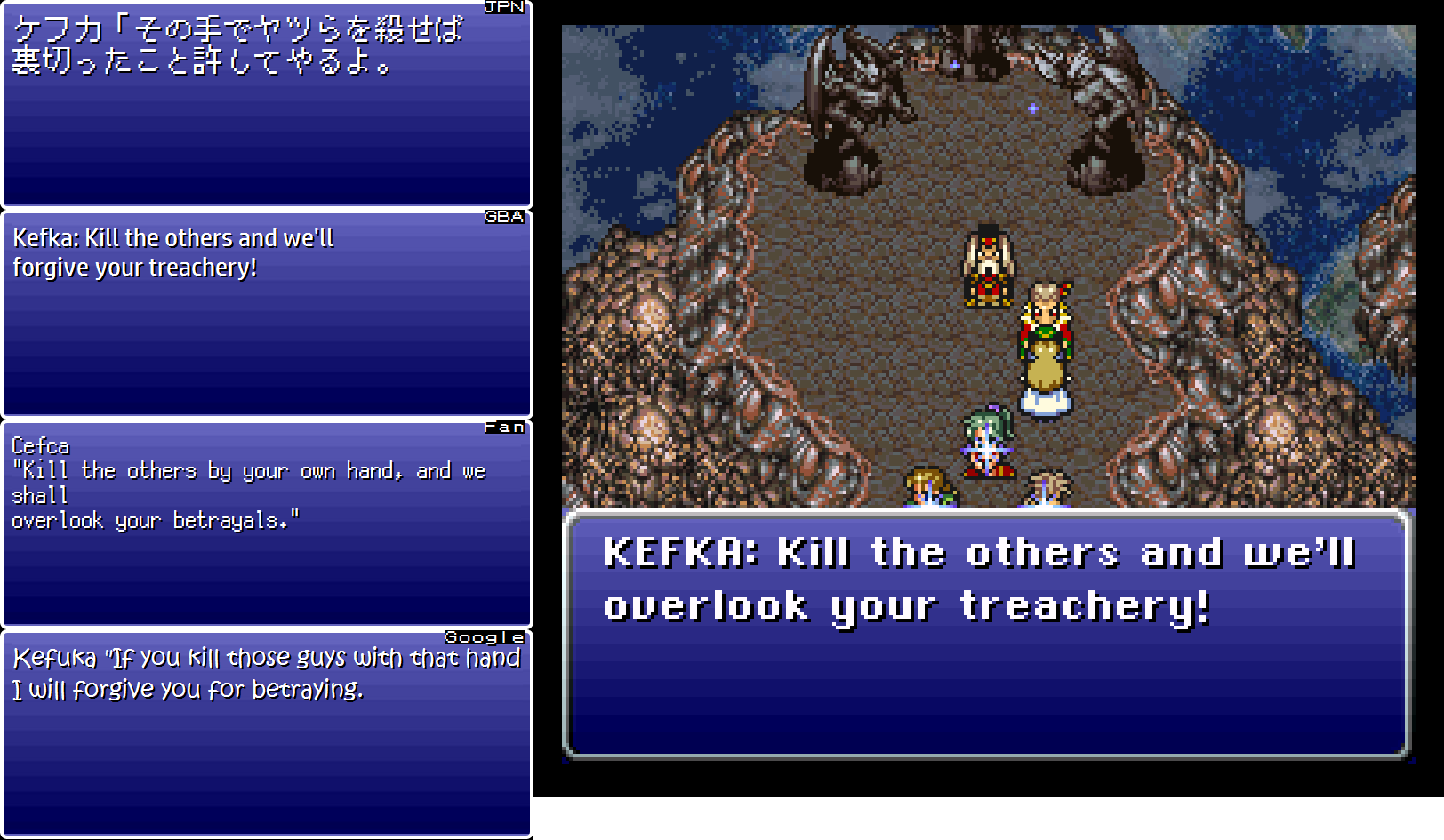
The Super NES translation has removed or rephrased every instance of death and killing in the script… until now. It was surprising to see the Super NES script use the word “kill” so openly here, and during a major story sequence at that! All other references to death and killing in this scene were rephrased in some way, but for some reason this one instance is an exception. And it also managed to get through Nintendo of America’s checks back in the day!
Hate Hate Hate
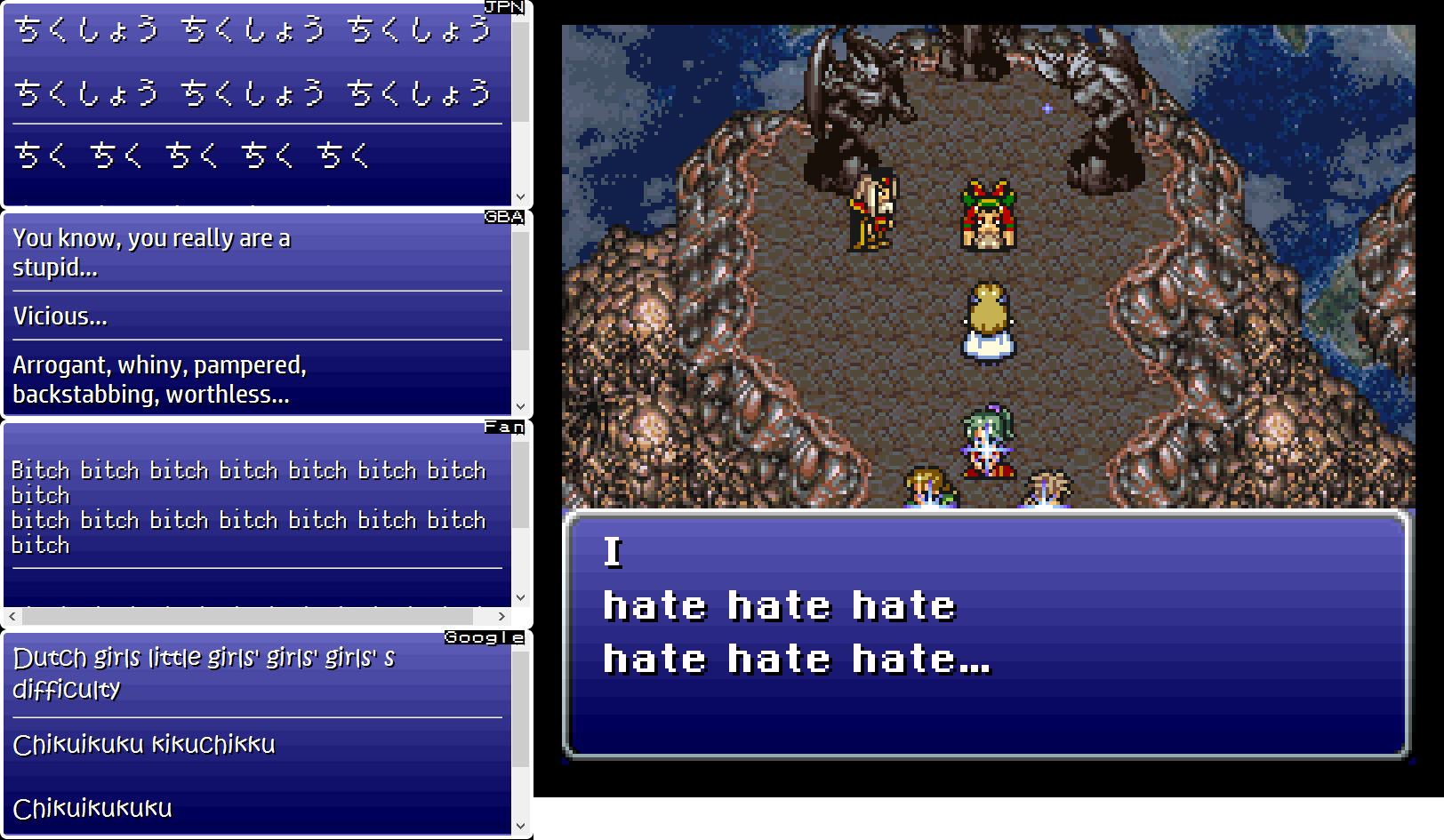
Celes stabs Kefka with a sword. In Japanese, Kefka keeps shouting ちくしょう (chikushō), which can be translated a bunch of different ways, from heavy swearing to “damn you” to all kinds of other phrases:
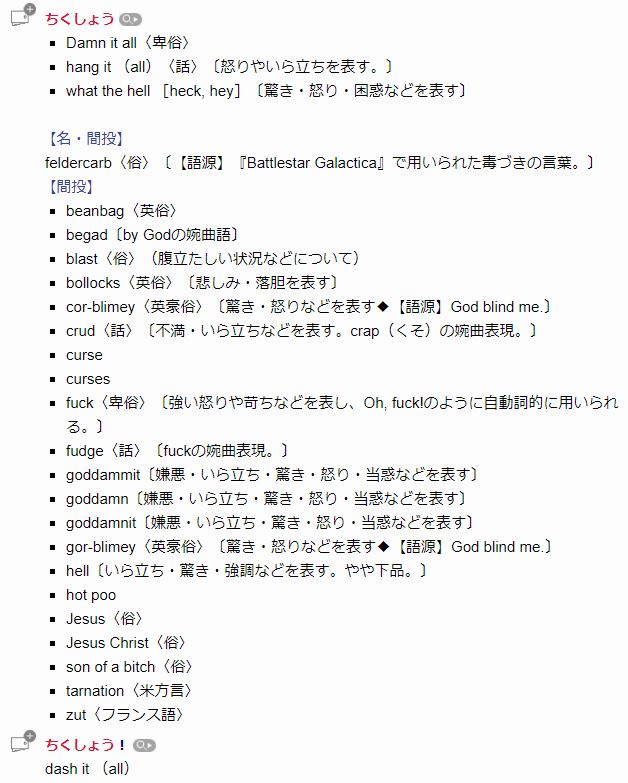
As the line goes on, Kefka starts saying only the first half of the word over and over, presumably because he’s in pain and freaking out.
Obviously, the Super NES translator couldn’t use any harsh language, so Kefka now just yells “hate” over and over, similar to what he says back in Thamasa in the Super NES translation. This has actually become a pretty iconic line that English-speaking fans remember fondly. In a strange way, I personally feel it’s more memorable than the original Japanese text too.
The GBA translation changes things entirely and gives Kefka actual logical dialogue in which he insults Celes over and over. Kefka stays coherent the entire time and no longer descends into saying half-words.
The fan translation has Kefka shouting “bitch” over and over. As the line goes on, this changes to “bit” so as to emulate Kefka’s half-word nonsense.
Google’s translation is crazy and entertaining and I have no idea how it came about. In fact, I even used this exact scene as a “what about other games?” example in my book about the time I Google-Translated Final Fantasy IV.
Merton Magic
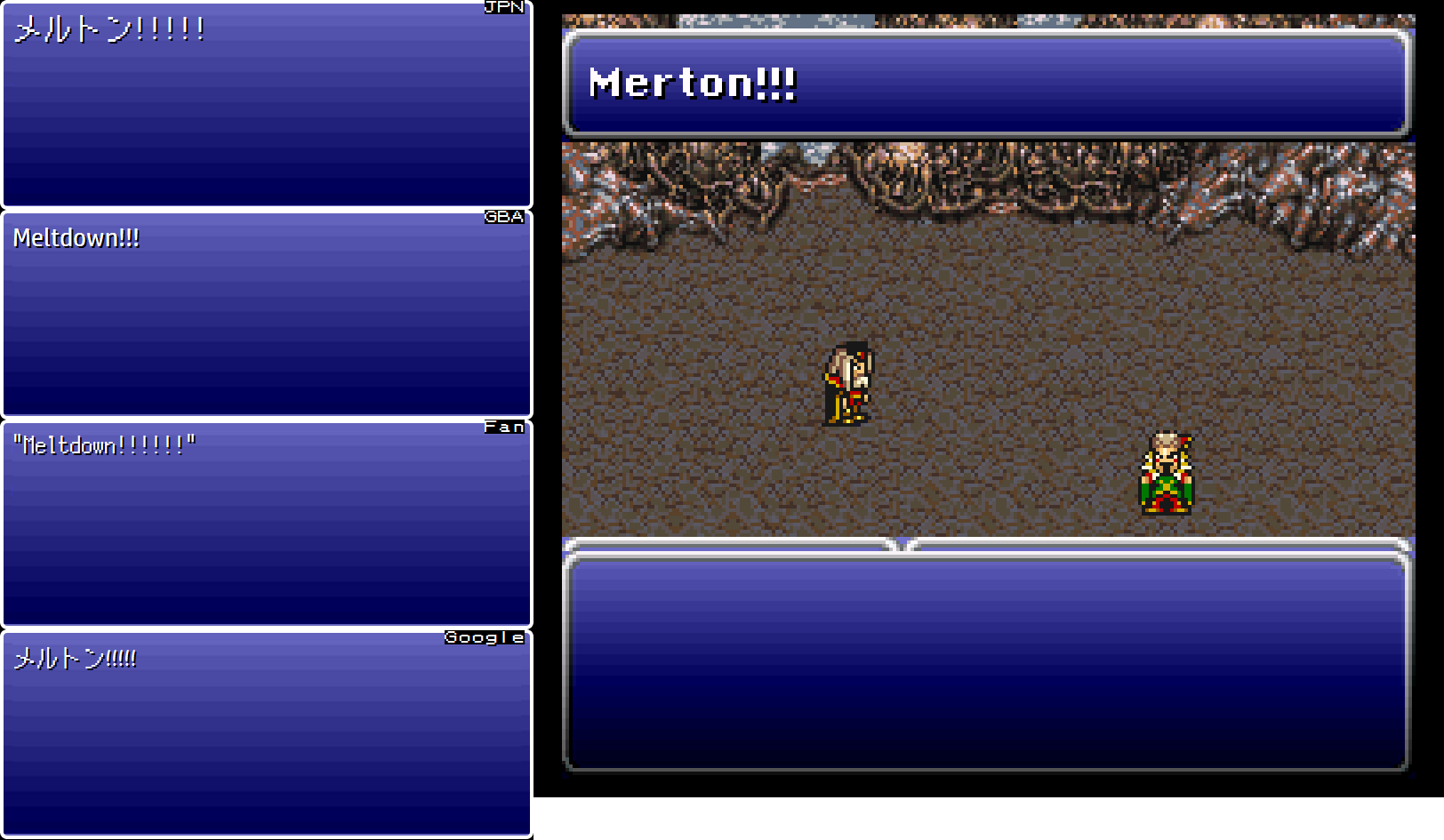
The “Merton” spell gets used for the first time during the Floating Continent segment of the game. For the longest time, English-speaking fans had no idea what this name was supposed to mean or where it came from. It’s referred to as “Meltdown” in the GBA translation and in many later games in the Final Fantasy. The fan translation also calls it “Meltdown”.
Part of the problem is that the Japanese name doesn’t make it clear what it should mean either. It’s called メルトン (meruton) in the Japanese version, which many translators would see as “Merton” or “Melton” at first glance. What’s more, it’s reasonably different from the normal Japanese spelling of “meltdown”, which is メルトダウン (merutodaun).
On top of all that, if you look up メルトン (meruton) in dictionaries or on Google, you’ll find the word “melton” everywhere… but that refers to a type of cloth. Such searches don’t turn up “meltdown” anywhere. So it’s definitely a tricky phrase.
In the end, I believe this problem it similar to how the Japanese developers used an unusual spelling for the word “Ultima”, which resulted in the “Atma” mistake in the Super NES translation. That or meruton was meant to be a strange variation of the word merutodaun, similar to “Firaga”, “Telepo”, “Poisona”, “Dejon”, and all the other not-quite-proper-English spell names found in the Japanese Final Fantasy games.
Whatever the case, the Super NES translator clearly didn’t have the resources available to know what meruton was intended to mean. Personally, I feel “Merton” sounds more unique and memorable, almost in the same exact way as the slightly-off Japanese spell names.
Well Done
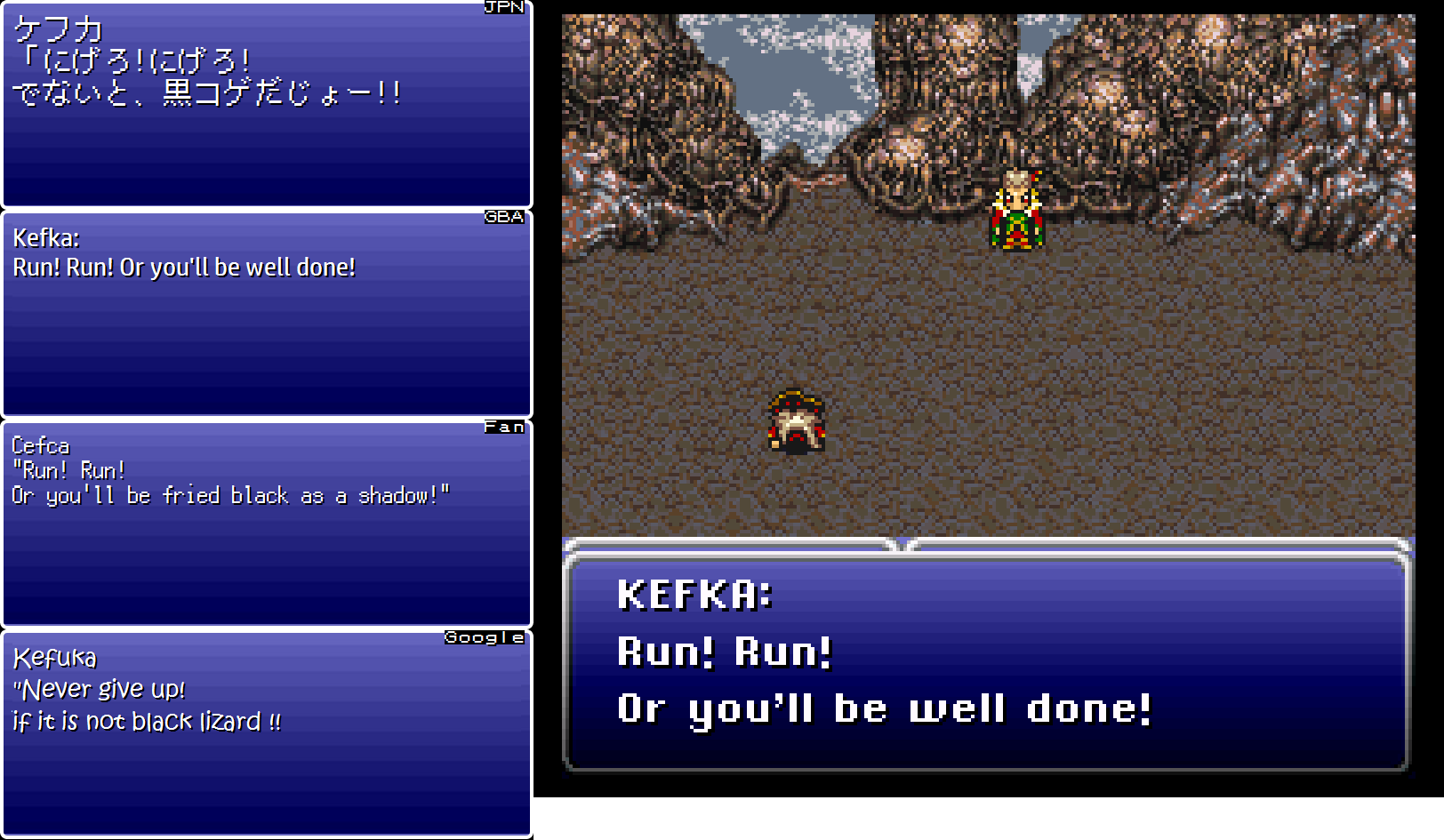
As Kefka uses powerful lightning magic to toy with Gestahl, he jokes around and says some silly things. In Japanese, he’s definitely goofing around in this line, as his pronunciation at the end is almost childish in spirit. A literal translation of what he says is:
Run! Run! Or else you’ll get blackened!
This was rephrased in the Super NES translation as:
Run! Run! Or you’ll be well done!
The content of the line and its snappy rhyming has made this quote one of Kefka’s most famous English lines in the game. So it comes as no surprise that it was left as-is in the GBA translation. The fan translation translated “blackened/charred black” as “fried black as a shadow”, which doesn’t match what’s said in the original text, but I’m assuming the extra content was an attempt to reintroduce the silliness of the Japanese line.
Previously, we saw how one of Kefka’s catchphrases remains memorable in Japanese but never really caught on in English. This “well done” line is a good example of the opposite phenomenon – a translated line wound up as a popular catchphrase even though the original line wasn’t particularly noteworthy.
Shadow’s Promise
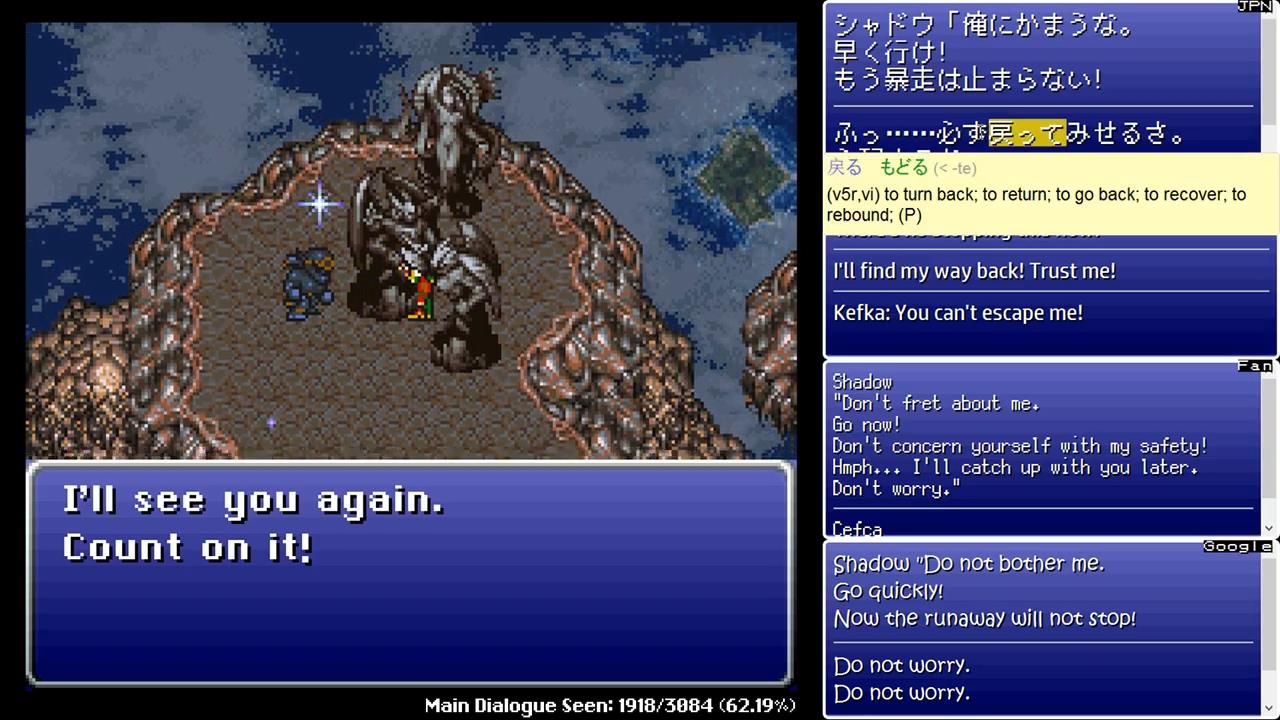
Shadow tells the party members to hurry and go while he tries to slow down the magic power overload and/or hold Kefka back. In the Super NES version, he then says:
I’ll see you again! Count on it!
This makes it sound like he’ll manage to survive somehow and that you’ll see him again later on in the story in a different place. So for first-time players, it probably comes as a slight surprise when you get the option to wait for Shadow before you jump off the floating continent. And it comes as even more of a surprise that you can actually save Shadow if you wait until the very last moment of the countdown.
When I first played the Super NES version, I remember being confused here and that I eventually just assumed that Shadow was sacrificing his life for good. In my eyes, his “I’ll see you again” line was meant in the “I’ll see you again in the afterlife” sense. So when I learned you can save him, it sounded like a weird schoolyard rumor at first.
In Japanese, though, Shadow’s line has a slightly different nuance. It’s something like:
I will make it back to you without fail. Don’t worry.
This suggests that he’s just going to stop the overloading for as long as possible and that he’ll try to catch up to the party members when he can. So the point about waiting for Shadow doesn’t come as quite a surprise at first, and waiting for him even down to the last few seconds becomes an act of trust on the player’s part. Basically, the game asks: how much do you trust Shadow? It’s up to you to believe him at his word or not.
The GBA translation fixes this line so that the original, intended nuance remains intact. The fan translation fixes it as well. Google’s translation algorithm does its own overloading and simply repeats “do not worry” twice.
Changed Forever
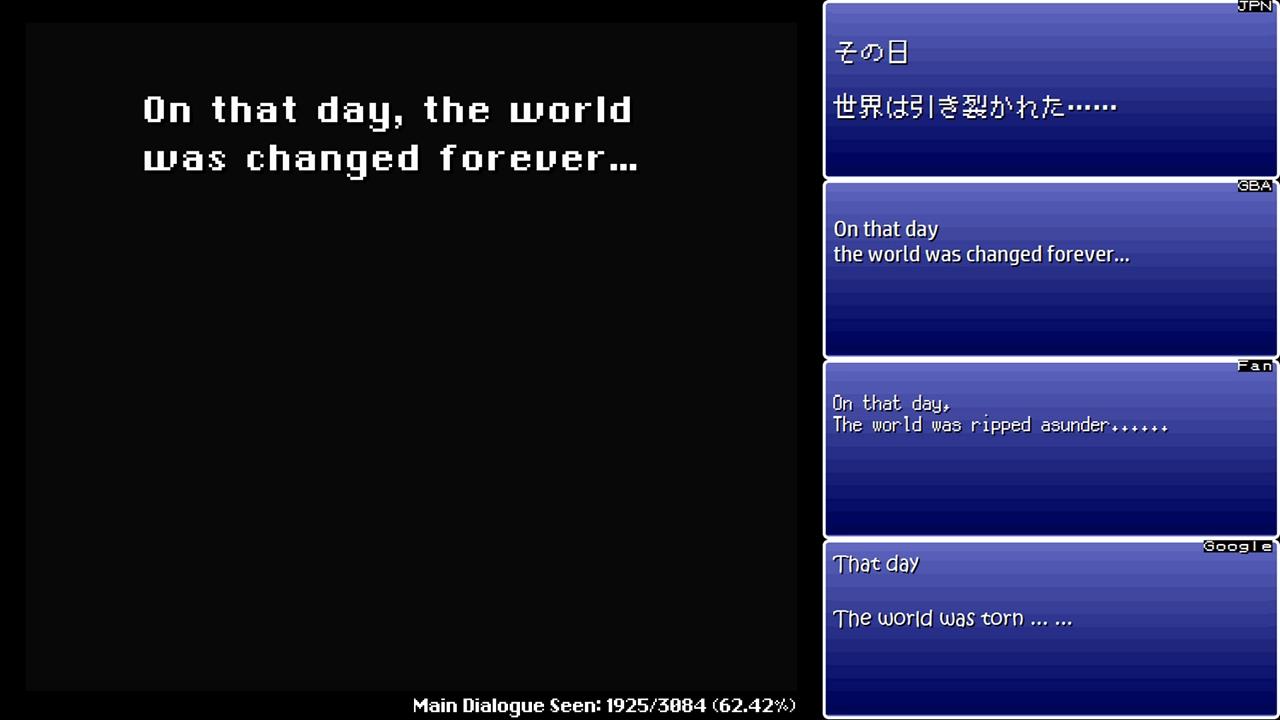
The world just got wrecked. After some time stuck on a black screen, a little bit of text appears. In English, it says:
On that day, the world was changed forever…
In Japanese, the line is more like:
On that day, the world was torn apart…
We can see that the GBA translation stays in line with the Super NES translation. The fan translation follows the original text. Even Google’s translation is pretty good at representing what the intended text says.
This starts the beginning of a new trend, though: the Japanese game always refers to the world being ripped or torn apart, while the Super NES translation drops such mentions or changes them in some way. The GBA translation sort of follows suit, but also uses the phrase “the cataclysm” a lot whenever there’s a reference to the world being “ripped apart”.
This “ripped apart” phrase appears so often in the Japanese script that I can see how it might feel repetitive in English, plus the Super NES translator was always in a struggle to save ROM space. But I thought I’d mention all this now since the topic comes up a lot during some of the following streams. It’s not a huge deal, but it’s definitely an interesting detail I never noticed before.


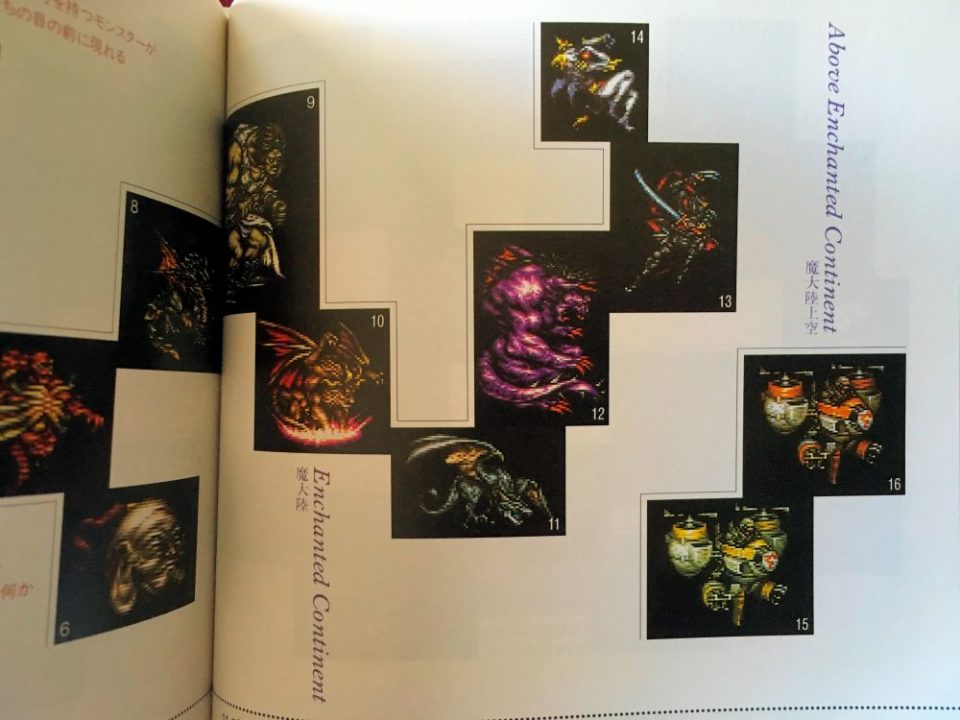
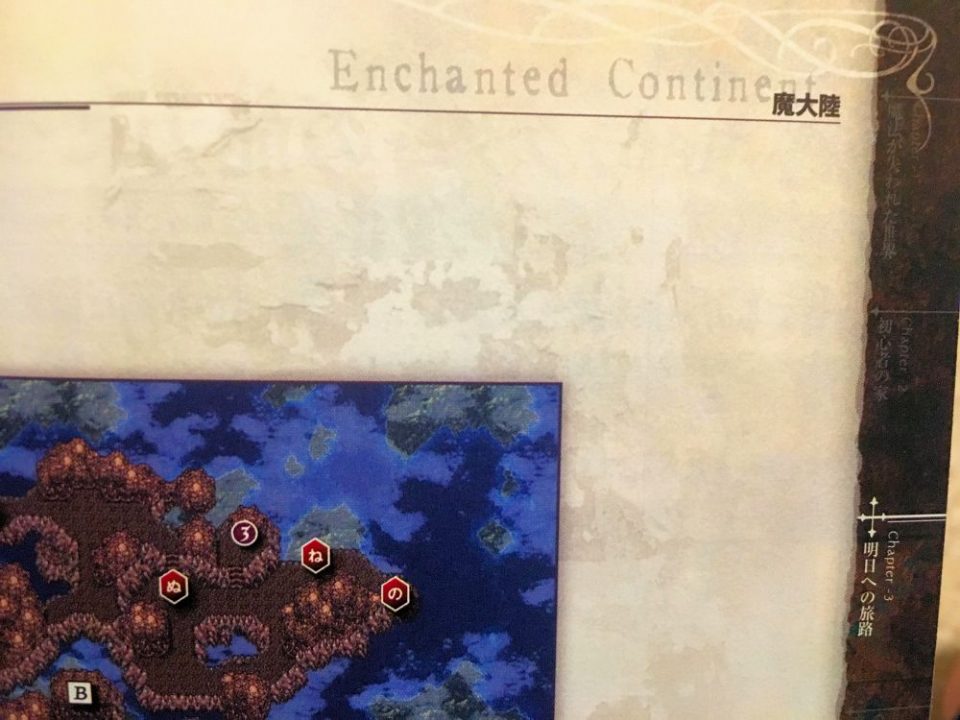
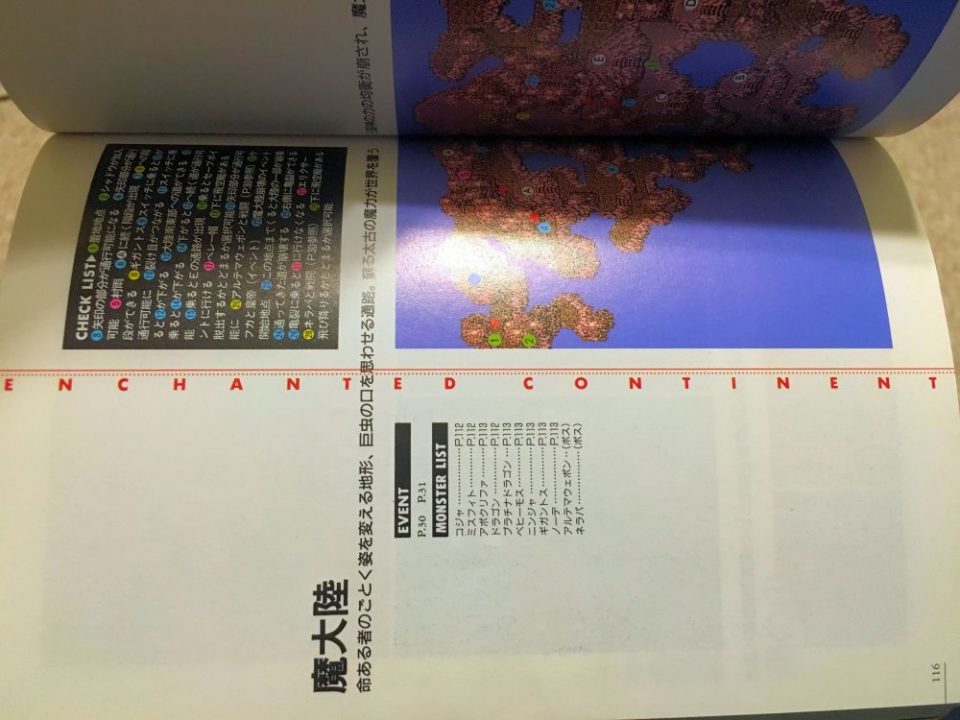

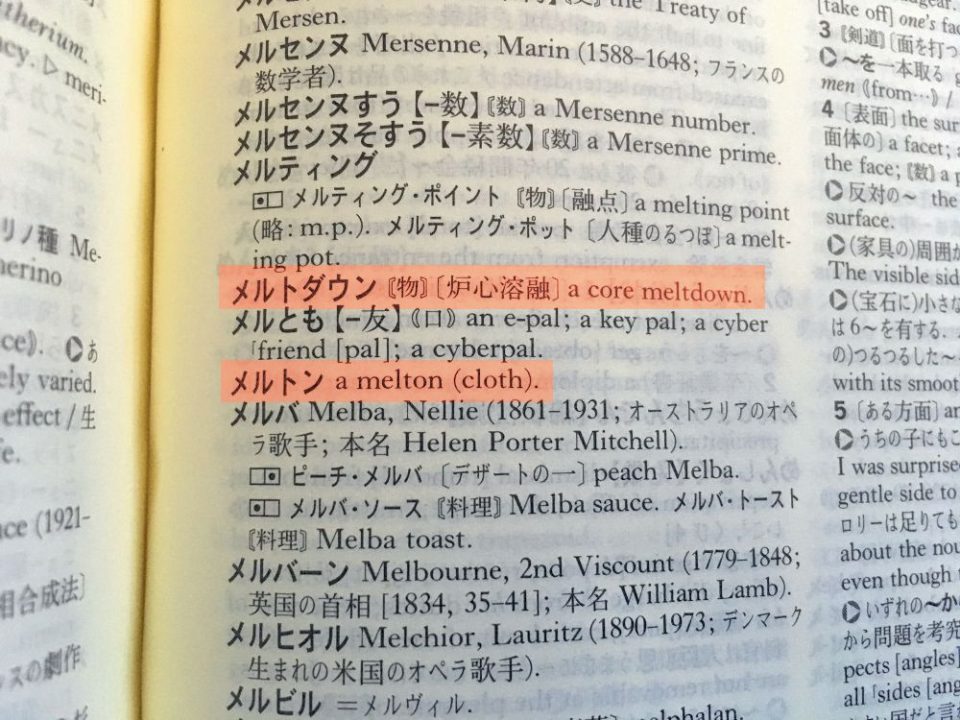
![press start to translate [Final Fantasy IV] press start to translate [Final Fantasy IV]](https://legendsoflocalization.com/wp-content/uploads/2019/08/bbenma.png)
Warning: this post uses IPA.
Incidentally, the vowel represented by the letter <> in Tryphon is pronounced by rounding your lips like when you say [u], but you instead make the sound [i]. The sound is typically rendered in katakana as ユ.
It is funny to see “zut” in the list of curses. When I first saw “Merton” I thought it was a derivation of “Merlin” and thus the ultimate wizard spell or something like that. I still like the name, even if it’s wrong.
I didn’t get Merton until it was translated properly later. I did figure out Atma, though.
I can’t remember what I made of it when playing FFVI, but most likely it reminded me of comedy acts: either Paul Merton or The Mrs Merton Show.
It turns out there are quite a few places and people called Merton; according to https://www2.merton.gov.uk/leisure/history-heritage/makingmerton.htm the etymology is something like ‘farmstead by the pool’.
Would “Master” have been better for Chupon/Typhon’s title? Given the original text, I think it would get the feeling across more.
Something like “Maestro” would be better. “Master” makes it sound like Typhon is his boss or something, which isn’t the case.
Typhon also shows up in the next game as a summon, and he’s wind elemental, which fits because he’s sneezing on the entire enemy party. I also assumed the name “Typhon” was making mention of the fact that he’s wind elemental, given his signature attack. On the other hand, I assume the SNES translator chose “Chupon” because he’s got a huge mouth and he assumed the name was a play on “Chewing”. Personally I like Chupon more, but this is one of the few cases where I’m fine with the renaming the GBA release did.
Actually, while I’m here, can I make a request? If you get a chance, could you someday do an article on why, in FF8, Rinoa’s Limit Break (Angel Wing in English) is “Vari” or “Valley” in Japanese? It’s such a weird, incongruous word, and it seems like exactly the sort of thing you could do a great job figuring out.
My dictionary gives the Hindu goddess Valli for ヴァリー, but that’s without the ー (though adding or subtracting those is a common variation in kanaized words). Nothing really links that to what the ability does though. My only other guess would be its derived from “variable”, which would fit the random nature of the results.
Yeah, my guess is “Vari” for Variety or Varied, but it’s a really weird use of the word. Other people have suggested Valley as a biblical reference, but I don’t buy it.
Maybe it was meant to be a variation of the word “valkyrie?”
The Japanese love to shorten katakana and develop their own lingo for foreign words.
Copypasted from last article’s comment:
The Japanese Final Fantasy wiki says
(英語版では「Angel Wing」だが)英語表記はvary。
性質や外見の変化、突然変異という意味。
「魔女への変化」が意訳だと思われる。
Makes a reasonable amount of sense, I guess. The Limit Break casts a random spell, so it could also refer to how the effect varies.
tldr the Japanese fanbase interprets it as the English word “vary”, as in “to change”. It’s one of those “kinda-but-not-entirely-correct-English” things that makes more sense to a Japanese speaker than to an English speaker.
I guess the Japanese really likes twisting languages around, huh? In general, I suppose FF8 has many things lost in translation, especially in regards to it’s school setting. Uniforms aside, the various ‘clubs’ such as the disciplinary committee are clearly modeled after those you would find in a Japanese school instead of a western one and so on. Give FF8 the chance it deserves.
All languages do that. English in particular is FULL of loan words that don’t mean what they do in the original language.
In other words, loan words can be more impressive than the words in their original languages, especially if it’s used to mean one specific thing.
I was always partial to Kefka’s “hate hate hate” freakout here. It always suggested to me that this was the moment his mind finally snapped; prior to this scene he was unstable and dangerous but largely coherent; from this scene on he’s consumed by the desire for wanton, senseless destruction. Overthinking it, sure, but there you are.
Which said: it would have been awesome to translate that as “beanbag beanbag beanbag.” 🙂
I agree. Both the original SNES translation AND the fan translation fit the tone of the Japanese dialogue here much much better than the GBA translation. I think that’s a first. The guy’s throwing a childish tantrum, he’s not giving some sort of well thought-out, eloquent insult.
The way Kefka ends his “well done” line in だじょー is interesting. It makes the whole thing rhyme in a way that’s not translated. I’m having a hard time reading it to myself since I can’t find a voice that fits though… it sounds kind of like a talking animal character?
“Chupón” means “sucker” in spanish. Sometimes with sexual connotations (you know what I mean), sometimes just someone who drinks too much. I always found this name kinda funny and creepy at once. “Typhoon” eliminates this “problem?” for spanish speakers, at least those who are a bit dirty-minded.
Chupón can also be interpreted as “pacifier”, which very certainly doesn’t make spanish speakers think of a big, scary monster. I’m also wondering if maybe Ultros is calling Chupon “Mr.” as in “teacher”, it would fit the whole “daisensei” thing.
I thought that too, I guess assuming that he had to suck a lot of air in to do his Sneeze. But yeah mainly because it fits with his general vibe of lighthearted creepiness
Specifically in Spain, “Chupón” means a football player who hogs the ball, which is a kinda hilarious name for a monster
The Meltdown name specifically originated in the localization for FFVIII, which was the next place the spell appeared. I would leave it as “Melton,” but “Meltdown” does follow the trend of spell names getting “straightened out” from almost-words to actual words in localization.
I understand why the name “Ultros” gets special care, but it still seems odd to “fix” Typhon’s name but not Orthros’s. They’re Greek mythology buddies.
It doesn’t even get THAT much special care, they leave it as Orthros in half the modern translations.
Mato posted a list in part 3.
Re: The Sabin scene with Duncan’s wife back in the World of Balance:
At the start of your #12 feed, when you load savegame #3, it looks like savegame #2 is just Terra, Locke and Edgar.
Is that game saved before meeting Sabin? If so, that would be very easy to take a 6 minute run through the mountain to Vargas’ scene and then back to South Figaro.
“Run! Run! Or you’ll be well-done,” certainly HAS become famous among English speakers. Famous enough that, during the fight against Kefka in FFXIV, he uses a mechanic that does damage to all players on one half the battlefield. When he introduces the mechanic, he says, “Burn half the field for twice the fun! Run! Run! Or you’ll be well-done!”
I always assumed that Chupon was called that because his signature move is a sneeze.
And the GBA version of Kefka’s “HATE HATE HATE HATE HATE!” rant reminds me of several diss tracks by the rapper Kool Moe Dee, who would put down LL Cool J by listing off negative words starting with L to describe J’s poor rap skills compared to himself.
It’s interesting that the GBA translations makes sure to preserve (or at least adapt) bits of the Woolsey translation that are considered particularly iconic or memorable and then ditches “hate hate hate hate hate” in favor of an actual sentence. Especially since that’s arguably farther from the original than Woolsey’s.
I always got a chuckle out of the spell’s name being Merton in the SNES version. That’s my grandfather’s name (though everyone always called him Mike).
Kefka got a lot of great lines in the SNES translation. ‘Hate hate hate’ should have been kept for the GBA.
Since many of the Japanese spell names are kind of corruptions of English words, I wonder of “Merton” could be “Molten?” But they don’t seem to swap vowel sounds around, so probably not.
For the longest time, I assumed “Merton” was meant to be a corrupted form of “Meteo”, since it’s a powerful Black Magic spell that has the downside of hitting both your group and the bad guys.